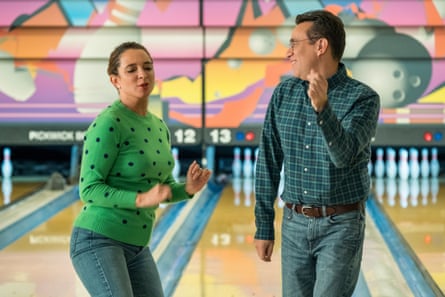Amazon’s Homecoming has an awful lot going for it – it is a tight, well-directed thriller that gives Julia Roberts plenty to do – but nothing stands out more than its length. Everything about the series, from its star to its tone to its subject matter to its home, screams hourlong prestige. But then, just as you’ve settled in for the long haul, the end credits roll. Episode one is wrapped up and put to bed in just 26 minutes. It’s incredible.
Better yet, Homecoming is just one of a raft of exceptionally good new half-hour dramas. Netflix has Maniac, Amazon also has Forever, and even Facebook has Sorry For Your Loss. Each of these shows have the traditional trappings of an hourlong, and yet they’re shorter and punchier and all the better for it.
They’re necessary, too. In an age where we’re being slowly suffocated with a tower of content that nobody can fully keep on top of, a half-hour drama simplifies things. Something like Maniac is a perfect example. It is a weird show – a weird premise that’s weirdly written and directed, and contains a clutch of weirdly mannered performances – and if it was made up of 10 hourlong episodes, the scale of it might put you off. But it’s short, so the risk is minimised. Whatever happens, you know it will be over quickly. The chances of encountering the sort of bloat you see on a series like House of Cards, where the middle six episodes uniformly fall into such a directionless fug that you invariably lose the will to live, are almost nil. Done right, a half-hour drama is all killer and no filler.
Contrast that with something like The Romanoffs. Those episodes are as long as a film. You have to put an entire evening aside to watch them, and the payoff is minimal. Every episode of The Romanoffs so far has felt like a good half-hour idea stretched beyond all reasonable limits by a quest for hubris-driven prestige, and it’s intolerable. Same goes for Game of Thrones. We’re promised that the final season will be entirely made up of feature-length episodes, which sounds like a hell of a slog.

In the time it takes to watch just one episode of The Romanoffs you can get almost halfway through an entire series of Forever, which is a much better bet. There’s more packed into one half-hour of Forever than most people can put inside an entire series. It’s a gem of a show; odd, moving, funny and extraordinarily well acted. It’s so odd, in fact, that you can imagine Amazon executives baulking at the prospect of shelling out for hourlong episodes. But the half-hour format suits it perfectly. It’s a story told with just the right amount of economy. It feels like an experiment that’s gone right.
However, there’s a chance that Forever won’t make a lot of end-of-year lists, and this might be a problem with half-hour dramas on the whole. Something like Sharp Objects, even though it often danced perilously close to the edge of self-parody, lasted for weeks and weeks. Reviews and recaps and word of mouth meant that it could build up a head of steam and remain part of the conversation for its entire duration. Meanwhile, Forever can be knocked off in a single afternoon. It’s a blip that culturally came and went with barely a murmur. Amazon would slit its neck before it offered up viewing figures but you suspect that, as terrific as it was, Forever was only watched by a fraction of the people who would have watched it if it was a big-time HBO hourlong spread out across two and a half months.
But maybe things are changing. Traditionally, the half-hour show has always been rooted in comedy, but comedy has changed. FX’s Louie paved the way for comedies to become more experimental and contemplative. This, in turn, led to Transparent; a bleak series that isn’t even remotely funny but is still somehow pitched as a comedy thanks to its half-hour runtime. And now the form has been perfected with Atlanta.
Atlanta is a comedy on paper, but the reality is much more multifaceted. It’s also a melodrama, a horror series, a dark fairytale. Atlanta’s success in pulling off such a broad spectrum of tones has softened us up, to the point that we can now expect more from our half-hour shows. GLOW can show a woman’s descent into addiction while also giving us a sketch-show bottle episode. Forever can peal away from telling the story of a dissatisfied marriage to show us the entire arc of an entirely unrelated relationship. Homecoming can be a taut thriller that also has a weird emphasis on pelicans. To watch a half-hour drama in 2018 is to fling yourself into the unknown. You can keep your full hours, the best television being made right now is 30 minutes long.

Comments (…)
Sign in or create your Guardian account to join the discussion